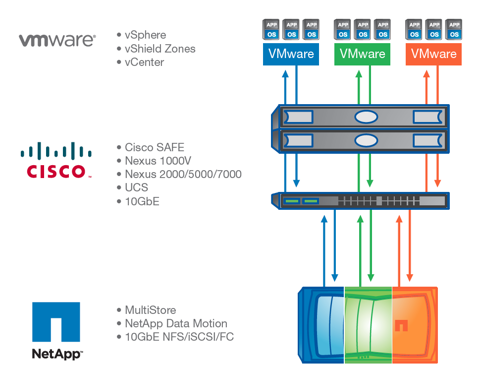
Appearing to further distance itself from VCE coalition partners EMC and VMware, Cisco this week expanded collaboration with storage titan NetApp to deepen integration and market reach.
Cisco and NetApp, a storage rival of EMC's, are stretching their alliance around the FlexPod architecture -- - which combines Cisco data center switches and servers, NetApp FAS storage systems, and partner applications and devices -- to the branch office and public cloud. Their alliance already serves the data center and private cloud markets. The expanded partnership includes efforts in technology integration, system development and market collaboration around FlexPod architectures available in a variety of configurations and packages that support an array of vendors' virtualization hypervisors.
The VCE coalition Cisco formed almost four years ago with EMC and VMware supports VMware virtualization and orchestration in a pre-configured vBlock footprint aimed predominantly at data centers and private clouds, says Jim McHugh, vice president of marketing for Cisco. VCE is believed to be splintering as the three founding companies - Cisco, EMC and VMware - become increasingly competitive and overlapping in an effort to become a single source of IT and cloud infrastructure.
[WITH PARTNERS LIKE YOU, WHO NEEDS... Cisco relationship stressed with Nicira buy: EMC]
McHugh, however, dismissed any notion that the expanded NetApp partnership diminishes the emphasis or activity on VCE.
"Absolutely not," he says, when asked if the broadened NetApp collaboration signaled an end to VCE. "It's complementary to that."
McHugh says Cisco values all partnerships and that VCE is a "very particular, very specific" use case: data centers and private clouds. The NetApp engagement includes branch offices and public clouds, he says, and involves a multi-site data center and multi-hypervisor strategy.
The extended activity will include deeper integration across computing, networking, storage and orchestration components of FlexPod, combined with broader support for FlexPod partners.
The deepened integration includes the ability of FlexPod configurations to manage up to 10,000 servers, allow organizations to aggregate several FlexPod racks, and enable multi-hop Fibre Channel over Ethernet. This is intended to enable service provider and distributed enterprise infrastructures to scale.
The FlexPod architecture will also now support Cisco UCS Manager 2.1, UCS Central and Cisco's recently acquired Cloupia data center orchestration and automation products. FlexPod will also support Cisco's Intelligent Automation for Cloud management system. FlexPod can also now be orchestrated by partner applications such as Microsoft System Center and Citrix CloudStack, the companies said.
Cisco and NetApp will also integrate Flash technologies at the host and storage levels to accelerate performance. At the server, applications running on Flash-optimized Cisco UCS can be further accelerated with NetApp Flash Accel, while at the controller and array levels, technologies such as NetApp Flash Cache and Flash Pools can be used to access cached data faster, the companies say.
For the branch office, Cisco and NetApp are extending the capabilities of ExpressPod to meet the compute, network and storage needs of remote sites. ExpressPod is a converged infrastructure configuration similar to FlexPod, but designed for the branch office. It is upgradable to and interoperable with FlexPod so branch offices can take advantage of virtualization and cloud computing for resource efficiency and cost reduction. ExpressPod includes support for VMware VSphere and will soon include support for Windows Server 2012 Hyper-V, the companies say.
For cloud service providers, Cisco and NetApp are developing a FlexPod capable of handling multi-data center service provider architectures. The development will combine NetApp Clustered ONTAP and NetApp FAS storage systems with Cisco UCS servers and Nexus 7000 switches to create pools of server and storage resources that can be scaled up or down, depending on application requirements.
These architectures will include common management and orchestration technologies, the companies say, as well as support for open source cloud computing technologies such as CloudStack and OpenStack.
Expanded partner support includes the addition of more validated business and private cloud applications for the data center. These include Oracle Database and applications, SAP Business Intelligence and SAP HANA applications, and Microsoft Private Cloud and Citrix CloudPlatform private cloud offerings.
And in addition to branch offices and public clouds, Cisco and NetApp will attempt to simplify deployment, management and orchestration of the FlexPod architecture for consumer-to-enterprise and cloud-to-cloud connectivity.
FlexPod has more than 2,100 customers and over 700 channel partners, the companies say.
http://www.eset.com
With the proliferation of devices, pervasive wireless connectivity and emergence of cloud technologies,
ReplyDeleteit is increasingly feasible to implement internet of things (IoT) to harness the enormous data collected and gain insights using advanced analytics.
Visit: http://www.esntechnologies.com/services/iot-internet-of-things/